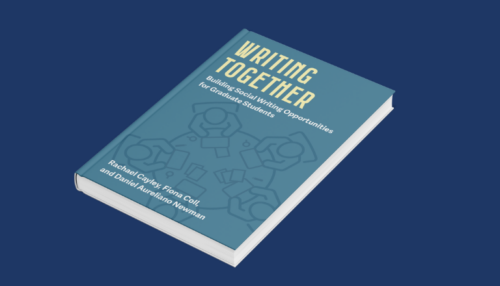Writing Together: New book by U of T professors offers insights on social writing initiatives

Rachael Cayley, Fiona Coll and Daniel Aureliano Newman (supplied images)
by Heidi Lee
Writing Together: Building Social Writing Opportunities for Graduate Students, a new book edited by Rachael Cayley, Fiona Coll and Daniel Aureliano Newman, strives to inspire graduate writing professionals to adopt social writing initiatives in their practices.
Cayley, director of the Centre for Graduate Professional Development and an associate professor, teaching stream, in the Graduate Centre for Academic Communication (GCAC) at the School of Graduate Studies, said that she, Coll and Newman had connected through their shared interest in the unique role that social writing plays in the lives of graduate students.
“We all happily teach writing, but we also find ourselves increasingly offering graduate students the opportunity to come together and write in the company of other writers,” Cayley said.
The book is also edited by Coll, who is an assistant professor, teaching stream, in the Institute for Studies in Transdisciplinary Engineering Education & Practice in the Faculty of Applied Science & Engineering and in the GCAC, and Newman, an assistant professor, teaching stream, in the Department of English and director of Graduate Writing Support in the Faculty of Arts & Science.

Writing Together contains 14 chapters featuring accounts from graduate writing professionals about how social writing programs are imagined and delivered. In honour of the nature of the book, Cayley, Coll and Newman actually wrote the opening and closing of the book together line-by-line, which they described as an “extremely enjoyable experience,” adding that none of them had experienced writing in a collaborative manner before.
“For a book about writing together, we thought it was apt to commit ourselves to genuinely writing together,” Cayley said.
The central claim of the book is that social writing initiatives are a valuable way to support graduate students in their attempts to become better writers, scholars, and members of their disciplinary communities.
“Graduate writing has an inevitable degree of isolation: each student is writing their own thesis. That solitary authorship, however, does not mean that the writing itself needs to be done alone. Instead, we would argue that graduate writing ought to be done with others, to allow community and peer learning to flourish,” Cayley said.
They hope Writing Together can allow graduate writing professionals to discover more about how others are approaching their social writing initiatives.
“Everyone’s situation is different, but all graduate writing professionals can benefit from hearing about the interesting and creative approaches of our peers.”
If you are interested in finding opportunities for social writing for graduate students, here’s a list of U of T initiatives:
- Dissertation Boot Camps and Writing Intensives (Graduate Centre for Academic Communication)
- Doctoral Completion Cohort (Centre for Graduate Professional Development)
- Graduate Communication Initiative (Faculty of Applied Science & Engineering)
- Graduate Writing Support (Faculty of Arts & Science)
- Graduate Writing Groups (Centre for Leaning Strategy Support)
- Inked: the HS Writing Collective (Health Sciences Writing Centre)
